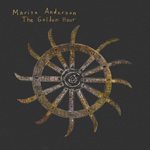|
|
 |
Dusted Reviews
Artist: Marisa Anderson Album: The Golden Hour Label: Mississippi Review date: Aug. 22, 2011 |

|
|
|
 |
Guitarist Marisa Anderson plays unaccompanied improvisations, unadorned but sharpened by amplification. Measure by measure, she doesn’t push boundaries. Play a few bars in isolation, and the licks will come from a recognizable tradition. Much of the time, that means country finger-picking or bottleneck blues moans, but also she moves through pastel chords that hint at jazz and the tightly-wound scales of West African pop. The runs of notes might be familiar, but as they add up, they show a fresh personality.
The operational metaphor for this kind of playing is a river. Something about the alternating plucks of fingerstyle and the natural voice of the guitar brings to mind moving water. But that likeness doesn’t hold for Anderson. While this is a low-key and mostly gentle record, it’s also very much a piece of electric music. There’s none of that woody acoustic thump that would make these tracks pastoral.
Her playing on “Clouds” is quiet. It halts on single, hanging notes. She seems to be tracing out the melody of a songbook standard. As it gathers itself, there’s a hint that she’s playing to a waltz-time beat, and it becomes altogether more country. But as it breaks into full chords, the strings crackle. It’s the sound of a rattling speaker cone, not a resonating box. Inside and plugged in, these are not tunes for the porch. They’re smoke clouds more than summer sky.
There’s a track called “Electricity” that follows the general plan of the Captain Beefheart/Ry Cooder workout of the same name. Both songs stagger around at the start, sweeping through knotted modal scales, then fall into place with slide guitar rips. Anderson follows a train-track rhythm that’s sleeker than The Magic Band’s bashing. It’s in no way a cover, but it circles around the spirit of the older song. They both buzz around Charley Patton’s foundations, bringing out the “z” in blooze.
Guitar amplifiers weren’t invented to distort, of course. They were made to allow the guitar to step out front, escaping the rhythm section and reaching the same volume of the horns. Pre-electric players like Patton were unaccompanied out of necessity. The Golden Hour occupies an ongoing niche, using electric tone without needing electric volume. Bass notes drone with presence and open strings have sparks that are usually hidden. The extreme case here is the light feedback and overtones called “Nebula.” It makes gestures toward loud, but it’s more about lonesome.
By Ben Donnelly
|







